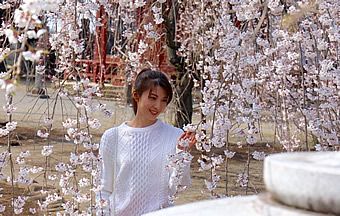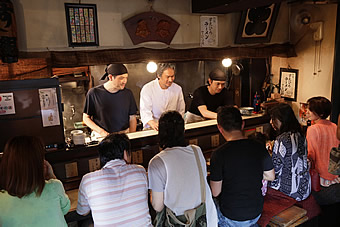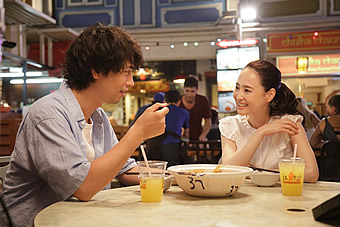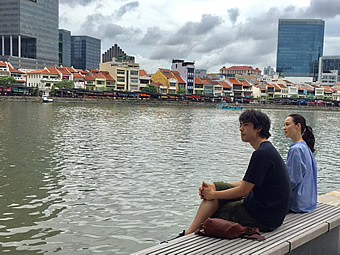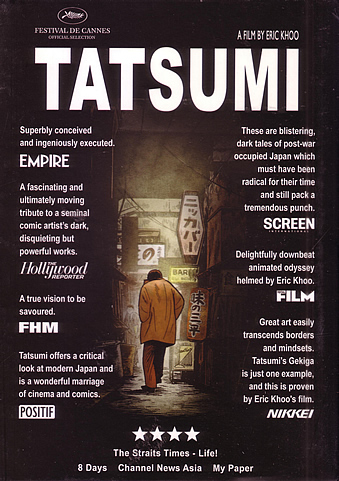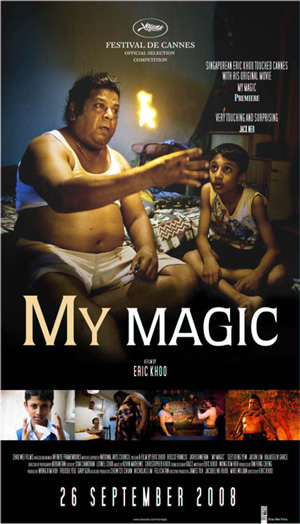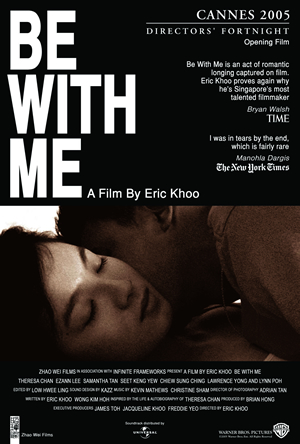RAMEN TEH (2018)
Genre: Drama
Director: Eric Khoo
Cast: Takumi Saitoh, Mark Lee, Jeanette Aw, Tsuyoshi Ihara, Tetsuya Bessho, Beatrice Chien, Seiko Matsuda
Runtime: 1 hr 30 mins
Rating: PG
Released By: Clover Films & Golden Village Pictures
Official Website:
Opening Day: 29 March 2018
Synopsis: Masato, a young Ramen chef, leaves his hometown in Japan to embark on a culinary journey to Singapore to find out the truth about his past. He uncovers a lot more than family secrets and delicious recipes.
Movie Review:
With a familiar but no less relevant message about how food brings family together, Eric Khoo’s latest movie ‘Ramen Teh’ becomes perhaps his most accessible film yet. To be sure, its elements are still distinctly Khoo – including his fascination with Japan (that first started with 2011’s black-and-white animated feature ‘Tatsumi’), food (which goes right back to his feature filmmaking debut ‘Mee Pok Man’ and also his subsequent ’12 Storeys’) and estrangement – but the hitherto unseen combination of a lightness in its tone and a mawkishness in its sentimentality makes it a lot more palatable to the casual viewer than his previous works, which seems befitting to the two signature dishes of Singaporean and Japanese cuisine that make up its title.
Penned by his regular collaborators Tan Fong Cheng and Wong Kim Ho, the cross-cultural drama follows young Japanese ramen chef Masato (Takumi Saito) who, following the unexpected death of his father Kazuo (Tsuyoshi Ihara), journeys to Singapore to acquaint himself with the sights, smells and tastes that were intimately linked to his parents and his own childhood. Through a series of flashbacks interspersed with his own present-day visit, we learn of how Kazuo had met his wife Mei Lian (Jeanette Aw) when he first came to our island city in the 80s to open a kaiseki restaurant, how Mei Lian’s mother had objected voraciously to his parents’ nuptials and threated to disown Mei Lian, and how the mother-and-daughter pair never had the opportunity to reconcile before Mei Lian’s unfortunate death not long after moving back to Japan with Kazuo and Masato.
All this is detailed in Mei Lian’s diary which Masato finds in his father’s old briefcase, and besides visiting the places his parents had spent many a happy memory (including the lookout tower shaped like a rocket ship at Upper Seletar Reservoir) and sampling Singapore’s culinary delights (among them, chicken rice, fish-head curry, laksa and chilli crab), Masato reconnects with his uncle Wee (Mark Lee) and asks that the latter teach him the family’s famed ‘bak kut teh’ recipe – after all, it was at Wee’s previous stall in Joo Chiat that his parents had first met over what Kazuo says is his favourite Singaporean dish. It isn’t difficult to guess how it gets from there to Masato’s titular fusion creation – with a little help from real-life ramen chef Keisuke Takeda no less - or for that matter how Masato eventually reconciles with his grandmother (Beatrice Chien), but what it lacks in surprise, it certainly makes up for in sincerity.
Oh yes, those familiar with Japanese family dramas will recognise in Kazuo the typical emotionally reserved father who keeps his own sorrows to himself; or in Mei Lian the loving mother who is the heart, soul and joy of the family; or in Masato the young optimist who seeks to find reconciliation for past regrets. But Khoo gives space for the story and his characters to take shape slowly and firmly, establishing the latter’s emotions and motivations and allowing them to drive where the narrative goes. Notwithstanding the despondency in the first act intended to drive Masato to explore his parents’ beginnings, the rest of the film is also illuminated with an infectious warmth and humour not often seen in Khoo’s films.
That is in part due to the writing as it is credit to the excellent performances from the cast. In particular, Lee has a steal-stealing supporting turn as his frank, straight-talking uncle, and easily the film’s most memorable scene is that of him teaching Masato how to make ‘bak kut teh’ in the kitchen. Japanese pop idol Seiko Matsuda also has a nice turn as a Japanese food blogger Miki based here in Singapore who becomes Masato’s local tour guide, the couple sharing a budding romance you’ll certainly root for by the end of the film. Ihara and Aw are gently winning as an inter-ethnic couple finding their way around linguistic barriers and sharing their love for each other’s culture. And the entire film itself is anchored by Saito’s keen presence, who makes his character entirely empathetic as well as his journey utterly palatable.
Like we said at the start, ‘Ramen Teh’ is probably Khoo’s most mainstream film yet, but that in itself isn’t necessarily a bad thing. Though familiar, his story of longing, forgiveness and reunion is moving, pleasing and even poignant. It also deserves to be appreciated as a film intended to commemorate fifty years of diplomatic relations between Singapore and Japan, and while it celebrates how far Japanese culture, especially its food, has become part of our own, the film also doesn’t gloss over the dark chapter between our histories that the older generation no doubt hold bitter memories of. But whether between peoples or between people, there is no happiness holding on to grudges, a message told emphatically through a simple but stirring story that will certainly stay with you.
Movie Rating:




(Like its two culinary dishes, this fusion of food, history and family is comfort food for the human soul - simple, heartwarming and poignant)
Review by Gabriel Chong
You might also like:
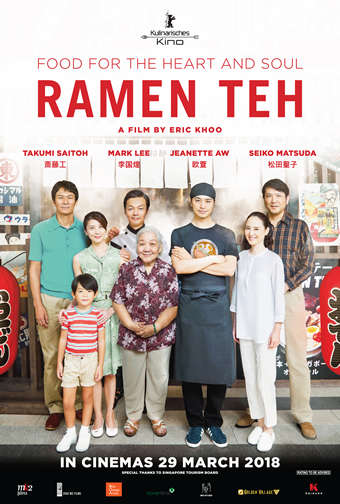
Movie Stills
